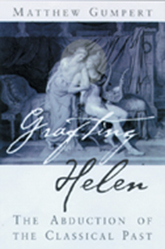|
Grafting Helen
The Abduction of the Classical Past
Matthew Gumpert
“Grafting
Helen is impressive in its scholarly range, its intellectual
verve, and its successful grafting of contemporary literary theory
onto classical representations of Helen, beginning with Homer's.”
—Mary
Lydon, University of Wisconsin–Madison
Classicism = cultural embezzlement
History is a love story: a tale
of desire and jealousy, abandonment and fidelity, abduction and
theft, rupture and reconciliation. This contention is central
to Grafting Helen, Matthew Gumpert's original and dazzling
meditation on Helen of Troy as a crucial anchor for much of Western
thought and literature.
Grafting Helen
looks at “classicism”—the privileged rhetorical
language for describing cultural origins in the West—as
a protracted form of cultural embezzlement. No coin in the realm
has been more valuable, more circulated, more coveted, or more
counterfeited than the one that bears the face of Helen of Troy.
Gumpert uncovers Helen as the emblem for the past as something
to be stolen, appropriated, imitated, extorted, and coveted once
again.
Tracing the
figure of Helen from its classical origins through the Middle
Ages, the French Renaissance, and the modern era, Gumpert suggests
that the relation of current Western culture to the past is not
like the act of coveting; it is the act of coveting, he argues,
for it relies on the same strategies, the same defenses, the
same denials, and the same delusions.
Matthew Gumpert is assistant professor of core curriculum
at Bilkent University in Ankara, Turkey. He has taught comparative
literature at the University of Wisconsin–Madison, the University
of Colorado at Boulder, and Harvard University. His published
work includes the English translation of Murder and Difference:
Gender, Genre, and Scholarship on Sistera's Death by Mieke
Bal.
Resources
Request Review Copy
Request Exam Copy
|

October 2001
432 pp. 6 x 9
|
